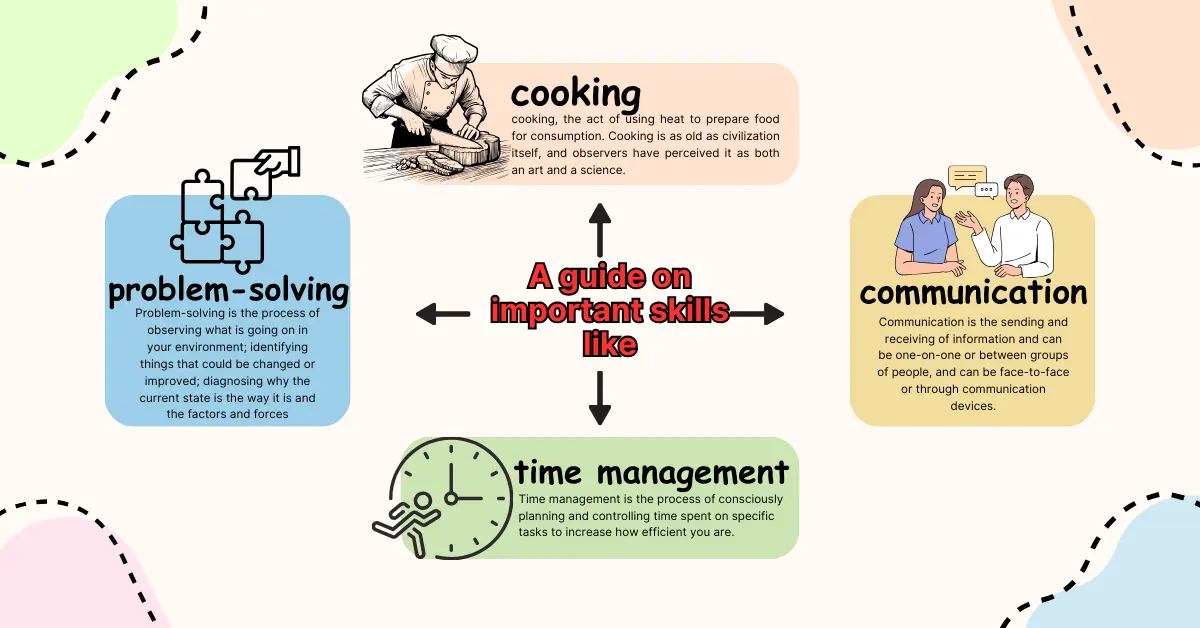
A guide on important skills like cooking, communication, time management, and problem-solving
- 108
- 0
- 0
In today’s fast-paced world, mastering essential skills can significantly enhance your personal and professional life. This guide will explore four crucial skills: cooking, communication, time management, and problem-solving. Whether you’re a student, a working professional, or someone looking to improve everyday life, developing these abilities can empower you to navigate challenges more effectively, make informed decisions, and build stronger relationships. Join us as we dive into practical tips and insights that will help you cultivate these skills and elevate your everyday experiences.
A guide on important skills like cooking, communication, time management, and problem-solving
In this blog, we will talk about the guide on important skills like cooking, communication, time management, and problem-solving. We’ll discuss cooking, which helps you prepare tasty meals and be creative in the kitchen. Next, we’ll look at communication skills, which are key for making friends and sharing ideas. We’ll also cover time management, which helps you organize your day and get things done on time. Finally, we’ll explore problem-solving skills that help you handle challenges with confidence.
Cooking: Feed Yourself and Others
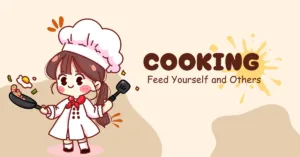
Cooking is super important. It’s not just about staying alive – it’s about eating tasty food, saving money, and taking care of your health. Here are some suggestions to assist you become a more useful cook:
Start with the basics.
Learn how to make a few simple dishes well. Things like scrambled eggs, pasta with sauce, or a basic stir-fry are great places to start. Once you’ve got these down, you can try more complicated recipes.
Read the whole recipe before you start.
This helps you know what to expect and makes sure you have all the ingredients and tools you need.
Learn some cooking words.
Knowing what “dice,” “sauté,” or “simmer” mean will make following recipes much easier.
Practice knife skills
Learning how to chop vegetables quickly and safely will save you tons of time in the kitchen.
Don’t be afraid to make mistakes.
Everyone burns food sometimes or makes a dish that doesn’t taste great. It’s how we learn and get better!
Try new things
Once you’re comfortable with the basics, try a new recipe or ingredient each week. This keeps cooking fun and helps you learn more.
Remember, cooking is a skill that gets better with practice. The more you do it, the easier and more fun it becomes!
Talking to People: The Art of Communication
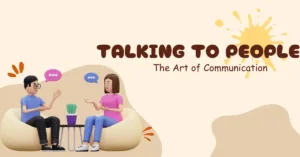
Being able to talk to people well is super important in all parts of life. It helps you make friends, do better at work, and have better relationships. Here are some tips to help you communicate better:
Listen more than you talk.
Pay awareness to what the other individual is saying. Try to understand their point of view, even if you don’t agree with it.
Be clear and direct.
Say what you mean in a simple way. Don’t make people guess what you’re trying to say.
Pay attention to body language.
How you stand, your facial expressions, and your tone of voice all send messages. Make sure these match what you’re saying.
Ask questions
This shows you’re interested in what the other person is saying and helps you understand them better.
Be kind and respectful.
Even if you disagree with somebody, always treat them with consideration. This makes conversations go much smoother.
Practice empathy
Try to put yourself in the other person’s shoes. Think about how they might be feeling.
Learn to say “no”
It’s okay to turn down requests or invitations. Just do it politely and clearly.
Good communication takes practice, but it’s worth the effort. The better you get at talking to people, the easier many parts of your life will become.
Managing Your Time: Making the Most of Your Day

Time management is all about using your time in the best way possible. It assists you to get more done and feel less stressed out. Here are some tips to assist you handle your time better:
Make a to-do list
Write down everything you need to do. This helps you remember tasks and feels good when you cross things off.
Prioritize your tasks
Figure out what’s most important and do something first.
Break big tasks into smaller steps.
This makes them less overwhelming and easier to complete.
Use a calendar
Write down appointments, deadlines, and important dates. Check it regularly.
Avoid distractions
Turn off notifications on your phone when you’re trying to focus on something.
Take breaks
Working non-stop can make you less productive. Take short breaks to rest your mind.
Learn to say “no”
Don’t take on more than you can handle. It’s okay to turn down requests if you’re already busy.
Set realistic goals
Be real with yourself about how lengthy things take. Don’t try to stuff too much into one day.
Create routines
Having a regular schedule for things like waking up, eating meals, and going to bed can help your days feel more organized.
Remember, good time management doesn’t mean being busy all the time. It’s about using your time in a way that lets you get things done and still have time to relax and enjoy life.
Solving Problems: Tackling Life’s Challenges
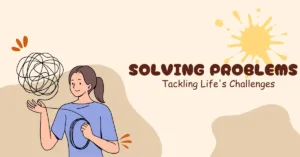
Problem-solving is a skill we use every day, from figuring out what to make for dinner to handling big issues at work. Here are some suggestions to help you become a more useful situation solver:
Stay calm
When you’re faced with a problem, take a deep breath. Panicking won’t help you think clearly.
Define the problem
Make sure you understand what the issue is before you try to solve it.
Gather information
Understand as much as you can about the issue. This will help you come up with better solutions.
Think of many solutions
Don’t just go with the first idea you have. Try to come up with several possible ways to solve the problem.
Consider the consequences
Think about what might happen if you choose each solution. This helps you choose the most suitable one.
Make a decision
Once you’ve thought it through, choose a solution and act on it.
Learn from the outcome
Whether your solution worked or not, think about what you can learn next time.
Ask for help
If you’re stuck, don’t be afraid to ask someone else for their ideas or advice.
Break big problems into smaller ones.
Some issues are too big to crack all at once. Split them down into smaller, more effortless parts.
Stay positive
Believe in your ability to solve problems. A positive attitude can help you think more creatively.
Recognize, that problem-solving is a talent that gets more useful with practice. The more problems you tackle, the better you’ll get at solving them!
Taking Care of Yourself: The Importance of Self-Care
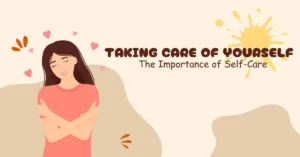
Self-care is about taking care of your physical and cognitive health. It’s not selfish – it’s necessary to live a happy, healthy life. Here are some tips for better self-care:
Get enough sleep
Most grown-ups need 7-9 hours of rest each night. Having a regular sleep schedule can help a lot.
Eat healthy foods
Try to eat lots of fruits, vegetables, and whole grains. Limit junk food and sugary drinks.
Exercise regularly
Find a type of exercise you enjoy, whether it’s walking, dancing, swimming, or playing a sport.
Take breaks
Make time each day to relax and do something you enjoy, even if it’s just for a few minutes.
Stay connected
Spend time with friends and family. Good connections are essential for your mental health.
Learn to say “no”
Don’t take on more than you can handle. It’s okay to turn down requests or invitations if you need time for yourself.
Practice mindfulness
This can be as simple as taking a few deep breaths and focusing on the present moment.
Limit screen time
Too much time on phones, computers, or TV can be bad for your mental health. Try to have some screen-free time each day.
Ask for help when you need it
If you’re feeling overwhelmed, talk to a friend, family member, or professional.
Do things you enjoy
Make time for hobbies and activities that make you happy.
Remember, taking care of yourself isn’t a luxury – it’s a necessity. When you take good care of yourself, you’re better able to handle life’s challenges and take care of others too.
Wrapping Up
These five skills – cooking, communication, time management, problem-solving, and self-care – are super important in life. They can help you in your job, in your relationships, and in taking care of yourself. The good news is that all of these skills can get better with practice. Don’t worry if you’re not great at all of these things right away. Nobody is! The necessary thing is to keep pushing and knowing. Every time you cook a meal, have a conversation, manage your time, solve a problem, or take care of yourself, you’re getting a little bit better at these important life skills.
Remember, everyone’s journey is different. What functions for one person power does not operate for another. So try out different tips and techniques, and find what works best for you. We hope this guide has been helpful! Keep practicing these skills, and you’ll be amazed at how much easier and more enjoyable life can become.
FAQs
1: What are some easy cooking tips for beginners?
Answer: Start with simple recipes, use fresh ingredients, and follow the instructions closely. Practice regularly, and don’t be afraid to experiment. Cooking is all about trying new things and learning along the way!
2: How can I improve my communication skills?
Answer: To improve communication, practice active listening, speak clearly, and maintain eye contact. Joining a club or group can also help you practice. Remember, the more you talk with others, the better you’ll become!
3: What are some effective time management strategies?
Answer: To manage your time better, create a daily schedule, set priorities, and break tasks into smaller steps. Use tools like calendars or apps to keep track of your tasks and stay organized.
4: How can I become better at problem-solving?
Answer: To improve your problem-solving skills, practice breaking down problems into smaller parts. Stay calm, think critically, and consider different solutions. Discussing challenges with others can also provide new ideas and perspectives.
5: Why are these skills important in everyday life?
Answer: Cooking, communication, time management, and problem-solving skills help you lead a balanced life. They enhance your relationships, increase your productivity, and prepare you to handle everyday challenges with confidence and ease.
Also Read:
Tips and strategies for managing time, boosting focus, and staying organized.
How to Build Strong Relationships: 7 Tips for Lasting Connections
References:
https://pmc.ncbi.nlm.nih.gov/articles/PMC10690614/
https://en.wikipedia.org/wiki/Time_management
Disclaimer: This guide provides general tips on important skills like cooking, communication, time management, and problem-solving. It is not intended to replace professional advice or specialized training. Always seek expert guidance for personalized learning.
Related post

7 Health Benefits of Assam Tea
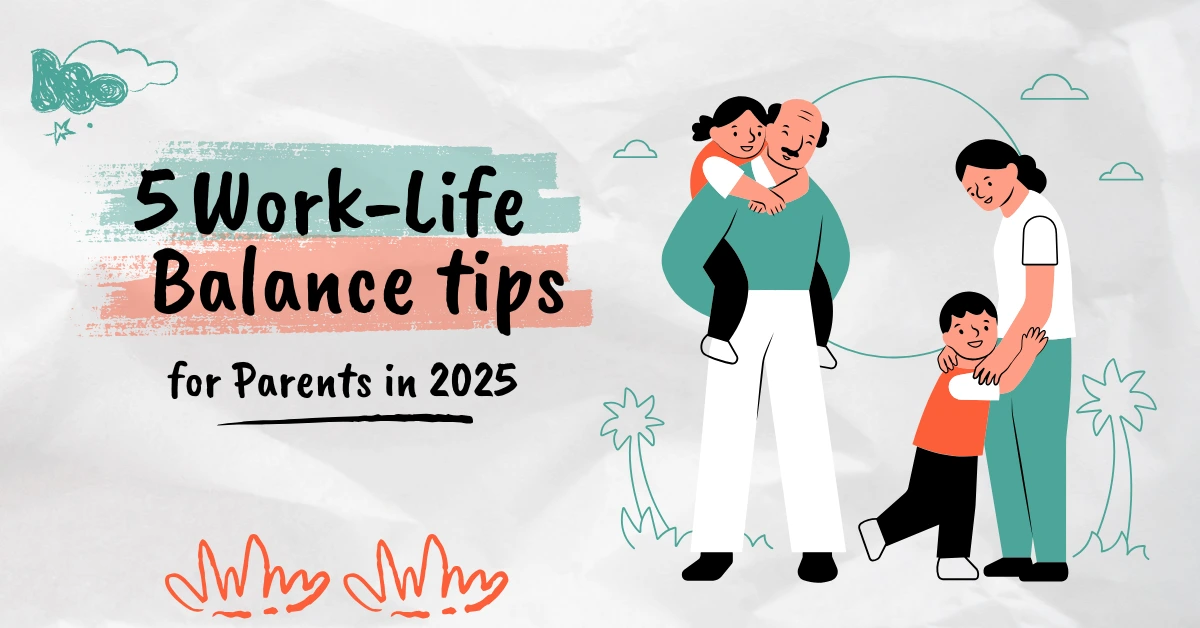
5 Work-Life Balance Tips for Parents in 2025
![5 Intermittent Fasting Benefits Backed by Science [2025]](https://myblogpod.com/wp-content/uploads/2025/01/Intermittent-Fasting-Benefits-6.webp)
